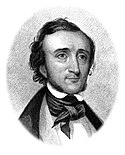
Back Библиография на Едгар Алън По Bulgarian Liste der Werke Edgar Allan Poes German Anexo:Bibliografía de Edgar Allan Poe Spanish 에드거 앨런 포의 작품 목록 Korean Dzieła Edgara Allana Poego Polish Lista de obras de Edgar Allan Poe Portuguese Bibliografia lui Edgar Allan Poe Romanian Библиография Эдгара Аллана По Russian Bibliografija Edgara Allana Poea Serbo-Croatian Edgar Allan Poe bibliyografyası Turkish
 |
| Topics related to |
| Edgar Allan Poe |
|---|
| In popular culture |
| In music |
| In television and film |
| Dark Romanticism |
| Edgar Awards |
| Death |
| Bibliography |
The works of American author Edgar Allan Poe (January 19, 1809 – October 7, 1849) include many poems, short stories, and one novel. His fiction spans multiple genres, including horror fiction, adventure, science fiction, and detective fiction, a genre he is credited with inventing.[1] These works are generally considered part of the Dark romanticism movement, a literary reaction to Transcendentalism.[2] Poe's writing reflects his literary theories: he disagreed with didacticism[3] and allegory.[4] Meaning in literature, he said in his criticism, should be an undercurrent just beneath the surface; works whose meanings are too obvious cease to be art.[5] Poe pursued originality in his works, and disliked proverbs.[6] He often included elements of popular pseudosciences such as phrenology[7] and physiognomy.[8] His most recurring themes deal with questions of death, including its physical signs, the effects of decomposition, concerns of premature burial, the reanimation of the dead, and mourning.[9] Though known as a masterly practitioner of Gothic fiction, Poe did not invent the genre; he was following a long-standing popular tradition.[10]
Poe's literary career began in 1827 with the release of 50 copies of Tamerlane and Other Poems credited only to "a Bostonian", a collection of early poems that received virtually no attention.[11] In December 1829, Poe released Al Aaraaf, Tamerlane, and Minor Poems in Baltimore[12] before delving into short stories for the first time with "Metzengerstein" in 1832.[13] His most successful and most widely read prose during his lifetime was "The Gold-Bug",[14] which earned him a $100 prize, the most money he received for a single work.[15] One of his most important works, "The Murders in the Rue Morgue", was published in 1841 and is today considered the first modern detective story.[16] Poe called it a "tale of ratiocination".[1] Poe became a household name with the publication of "The Raven" in 1845,[17] though it was not a financial success.[18] The publishing industry at the time was a difficult career choice and much of Poe's work was written using themes specifically catered for mass market tastes.[19]
- ^ a b Silverman 1991, p. 171
- ^ Koster 2002, p. 336
- ^ Kagle 1990, p. 104
- ^ Poe 1847
- ^ Wilbur 1967, p. 99
- ^ Hayes 2002, pp. 445–465
- ^ Hungerford 1930, pp. 209–231
- ^ Grayson 2005, pp. 56–77
- ^ Kennedy 1987, p. 3
- ^ Fisher 2002, p. 72
- ^ Meyers 1992, pp. 33–34
- ^ Sova 2001, p. 5
- ^ Silverman 1991, p. 88
- ^ Sova 2001, p. 97
- ^ Hoffman 1998, p. 189
- ^ Meyers 1992, p. 123
- ^ Hoffman 1998, p. 80
- ^ Krutch 1926, p. 155
- ^ Whalen 2001, p. 67
© MMXXIII Rich X Search. We shall prevail. All rights reserved. Rich X Search